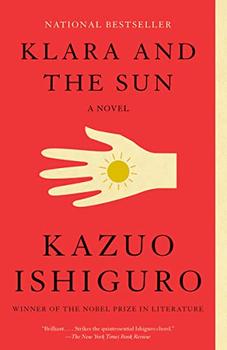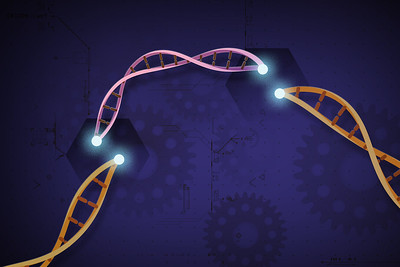Summary | Excerpt | Reading Guide | Discuss | Reviews | Beyond the book | Read-Alikes | Genres & Themes | Author Bio

Klara and the Sun is a magnificent novel from the Nobel laureate Kazuo Ishiguro--author of Never Let Me Go and the Booker Prize-winning The Remains of the Day.
Klara and the Sun, the first novel by Kazuo Ishiguro since he was awarded the Nobel Prize in Literature, tells the story of Klara, an Artificial Friend with outstanding observational qualities, who, from her place in the store, watches carefully the behavior of those who come in to browse, and of those who pass on the street outside. She remains hopeful that a customer will soon choose her.
Klara and the Sun is a thrilling book that offers a look at our changing world through the eyes of an unforgettable narrator, and one that explores the fundamental question: what does it mean to love?
In its award citation in 2017, the Nobel committee described Ishiguro's books as "novels of great emotional force" and said he has "uncovered the abyss beneath our illusory sense of connection with the world."
While the uneasy mood of Klara and the Sun is partly due to blatant parallels to today's world, it also results from the novel's somewhat traditional depiction of the relationship between humans and AI. On this front, Ishiguro's work does not break any new ground; the tensions present in many other stories are implicit here, too. Yet despite drawing on previously explored themes, Ishiguro is generally able to avoid falling into cliché. This is partly because of the emphasis the author places on faith. AFs are solar powered, and exercise a sort of belief in the sun that resembles religious worship, largely stemming from it being their source of energy. Klara views the sun as an omnipotent force capable of healing humans and AFs alike. This allows for a degree of spirituality not often seen in stories about AI, and imbues Klara's experiences and outlook with a very human inclination...continued
Full Review
 (736 words)
(736 words)
(Reviewed by Elspeth Drayton).
 One of the central mysteries in Kazuo Ishiguro's novel Klara and the Sun surrounds the question of how some children are "lifted" and others are not. Seemingly benefiting from a class-based or other means-based differentiation, those who are lifted have access to higher-quality education and additional advantages. Precisely how some children are lifted is never entirely clear, though it is implied early on that medical or scientific intervention is involved, and some type of gene editing seems to be a likely explanation.
One of the central mysteries in Kazuo Ishiguro's novel Klara and the Sun surrounds the question of how some children are "lifted" and others are not. Seemingly benefiting from a class-based or other means-based differentiation, those who are lifted have access to higher-quality education and additional advantages. Precisely how some children are lifted is never entirely clear, though it is implied early on that medical or scientific intervention is involved, and some type of gene editing seems to be a likely explanation.
There are several forms of genome editing (gene editing) technology in the modern world that allow scientists to manipulate the DNA of various organisms. Perhaps the most scandalous use of such technology (and the ...

If you liked Klara and the Sun, try these:

by Annalee Newitz
Published 2025
A cozy near-future novella about a crew of leftover robots opening their very own noodle shop, from acclaimed sci-fi author Annalee Newitz.

by Anton Hur
Published 2025
Negotiating the terrain of Kazuo Ishiguro's Klara and the Sun and Emily St. John Mandel's Sea of Tranquility, a brilliant, haunting speculative novel from a #1 New York Times bestselling translator that sets out to answer the question: What does it mean to be human in a world where technology is quickly catching up to biology?